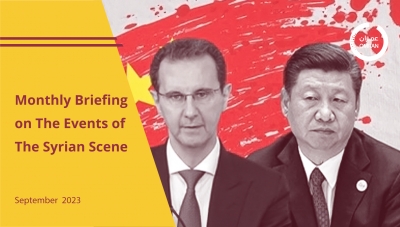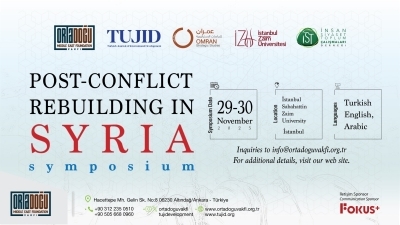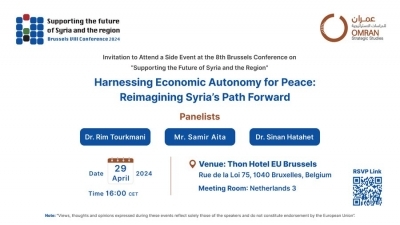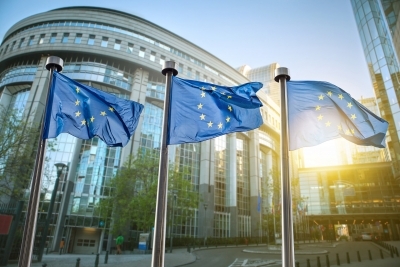General Summary
This report provides an overview of the key events in Syria during the month of September 2023, focusing on political, security, and economic developments. It examines the developments at different levels.
- Politically, the Arab initiative involving the Syrian Regime has stalled due to ongoing drug smuggling from Syria to neighboring countries, unresolved refugee issues, and the regime's unresponsiveness to calls for supporting the political process.
- Militarily, persistent security tensions and clashes have unfolded in Deir Ezzor between tribal fighters and the Syrian Democratic Forces “SDF”. Meanwhile, Hasakah experienced several days of conflict between regime forces and the National Defense Forces “NDF”. Additionally, armed conflicts have erupted between opposition factions and “Hay'at Tahrir al-Sham” in Aleppo's countryside.
- Economically, Bashar al-Assad's trip to China failed to secure tangible economic benefits, with the visit merely concluding with the signing of protocol agreements, such as a Syrian-Chinese strategic cooperation pact.
Regime Strategies: Escaping Liabilities and Pursuing Alternatives
Civilian protests persist in As-Suwayda and its outskirts for a second month without expanding geographically, while the regime refrains from intervening as long as the movement remains local and limited. The protests intent on distinguishing between the state and the regime, emphasizing the necessity to maintain basic services, with ongoing demands to establish an economic crossing with Jordan to improve the local economy. Diplomatically, the ongoing protests has redirected attention to the Syrian issue, facilitating opposition diplomatic meetings and garnering international support for Sheikh Hikmat al-Hijri. However, the future political transition in Syria remains uncertain despite the diplomatic efforts and UN envoy “Geir Pedersen's” repeated visits to rejuvenate the constitutional committee.
Officials from various Arab nations have expressed their discontent with the regime’s ineffectiveness in ensuring the Arabic initiative's success, especially due to:
- Ongoing drug flow from the southern border of Syria.
- The unresolved refugee return issue.
- Syrian regime's lack of support for the political process.
Bashar al-Assad's visit to China, his first in 19 years, does not appear to have a tangible impact on political and economic agendas in the near term, aside from media narratives. The pro-regime media have framed the visit as a pursuit of economic alternatives, hinting at impending economic agreements and substantial Chinese projects.
Shifts Within Different Areas of Influence and Control
In the Regime held-areas, The Syrian regime has persistently dismantled military and security checkpoints across various regions, including the southern fronts, aligning with its policy to curtail military and security visibility. However, the Fourth Division, under Maher al-Assad's leadership, has refused removing its checkpoints in the south, like its refusal in the eastern Qalamoun region, attributed to the economic leverage gained through enforcing royalties and overseeing the drug trade.
The Jordanian Air Force conducted two strikes on a drug trafficking location in southern As-Suwayda in response to escalating threats from ongoing drug smuggling operations. Recently, the smuggling activities have posed heightened threats to Jordan, especially after incorporating advanced equipment like drones. The Jordanian border forces reported that they successfully neutralized two drones, utilized by smugglers, during September.
Armed clashes erupted in the city of al-Hasakah, lasting several days, between the regime forces and the NDF militia, led by Abdul Qader Hamo. The conflict resulted in Hamo's death and injuries to dozens of civilians. The regime declared the security operation over after its forces seized the building where the NDF was holed up.
Hamo, dubbed the “King of the Captagon” in Hasakah, appeared in a pre-death video, criticizing “Ali Mamlouk” and the “Baath Party” leadership, accusing them of corruption and demanding large sums of money to settle his situation.
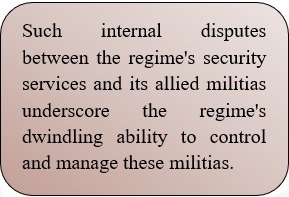
In the SDF held-areas, Armed clashes persisted between certain Arab tribes and SDF forces in Deir Ezzor, even after the SDF declared an end to the “Rebellion” and seized control of Dhiban, home to Sheikh al-Akidat Ibrahim al-Hafil. Al-Hafil, along with some of his fighters, managed to relocate to different areas. The recent tribal uprising highlighted the frailty of the Autonomous Administration's governance and the disconnect between communities and the administration purporting to represent them.While current maps of influence and control appear stable, numerous signs suggest potential future shifts in the security and military landscape, especially with the growing influence of militias allied with Iran and the Assad regime in northeastern Syria.
During September, TSK drones conducted several strikes, targeting and killing SDF leaders, including “Haval Aslan”, leader of the Asayish forces in al-Qamishli, and “Ayman Jolie”, a commander of the Asayish forces in the Jazira region.
In the Opposition held-areas, in Northwest Syria witnessed military skirmishes between the Second Corps, spearheaded by the Sultan Murad Division, and groups affiliated with Hay'at Tahrir al-Sham, including “Ahrar Olan” and “al-Shahba Gathering.” The conflict centered around control of the strategic “Hamran” crossing, utilized for oil smuggling between the eastern and western Euphrates. These clashes are embedded within the war economy dynamics, where such crossings serve as a vital economic resource for the factions.
Economic Problems Multiply, Solutions Yet to be Found
Syrian Regime
Internationally Relations:
Syrian-Chinese Relations:
The visit of Bashar al-Assad and the accompanying economic delegation to China did not yield any tangible economic results that might rescue his government amidst the suffocating crisis it is experiencing.
- The visit was limited to signing protocol agreements, such as Syrian-Chinese strategic cooperation, and three cooperation documents were signed between the two sides; the first is economic cooperation, the second is for exchange and cooperation in the field of economic development, and the third is a cooperation plan within the Belt and Road framework.
- These agreements express only a desire to cooperate without binding agreements for either party.
It is unexpected that China's role will exceed providing humanitarian support to the regime and its incubator, for several reasons, most importantly:
- The strict American and European sanctions on the regime, which hinder the initiation of any major projects before achieving a political solution.
- The deteriorating security conditions and lack of stability in Regime held-areas reduce China likelihood of contributing to the Belt and Road initiative.
- Lack of an investment environment and laws that protect and encourage foreign investors.
- The fierce competition between Russia and Iran and their current control over wealth and trade routes.
Syrian-Iranian Relations:
- Iran has scheduled a plan to establish an oil refinery with a capacity of /140,000/ barrels per day, alongside the existing refineries in Homs and Baniyas.
- Sanctions on the Syrian and Iranian oil sectors hinder the implementation of oil projects in Syria that could contribute to financing the regime.
Domestic Economy and Prices:
- The regime has raised the prices of domestic and industrial gas cylinders, and this increase is expected to be reflected several times over in the black market.
- Electricity prices have been raised by 200%, which may lead to a general increase in inflation in the coming weeks due to its impact on the costs of raw materials and the final product.
- Syrian markets are experiencing a sharp shortage and price increase in baby milk, despite the arrival of quantities as humanitarian aid.
- Fruit prices have risen by 50% this year due to various reasons such as increased farming costs, fertilizer prices, transportation, labor, and most significantly, diesel, which is sold to farmers at about /18,000/ SYP per liter.
SDF Held-Areas
The “Autonomous Administration of North and East Syria” priced the purchase of cotton at $/800/ per ton without announcing its purchase of the crop, which sparked criticisms from farmers.
Cotton farmers have suffered numerous problems this current season, elevating their loss ratio, with the most prominent issues being:
- A rise in the prices of fuels, fertilizers, and pesticides.
- Crop infestation with pests.
- Difficulty in selling crops outside the areas controlled by the SDF.
- The Autonomous Administration's refusal to purchase the farmers' crops, contrary to the previous seasons.
The “Autonomous Administration” increased the price of a bread bundle by up to 200% just days after improving bread quality in its areas. A bread bundle is now sold for /1,000/ SYP, up from /350/ SYP Lira. This decision comes after a 400% increase in fuel prices. The administration bases its price increase for essential items on:
- Rising production costs and the difference with the sales price.
- The administration's move towards reducing social support quotas under the pretext of implementing public services and infrastructure projects.
Opposition Held-Areas
The “Interim Government's” Ministry of Finance and Economy has inaugurated the inaugural investment conference, partnering with Aleppo University, the Economists' Union, and the 2020IDEA Foundation. The conference is designed to:
- Foster economic growth in liberated areas.
- Enhance living standards and amplify job opportunities.
- Reinstate the inflow of United Nations assistance into northwestern Syria via the Bab al-Hawa border crossing with Turkey, following a suspension exceeding two months.
In the western countryside of Aleppo, local councils shared a “notice,” explaining an agreement with the Energy and Electricity Company to cut the price of household electricity by 30%. This price cut was approved after the Turkish government agreed to financially support the electricity sector for companies that provide electricity to northern Syrian areas. Concurrently, the local council in “Bulbul”, located in the Afrin area, inaugurated a new water station to address the locale's drinking water needs, particularly considering the substantial surge in the area's population.
The “Salvation Government's” Public Telecommunications Institution has refurbished the communications network in “Biret Armanaz” ensuring residents have access to internet and landline services.

